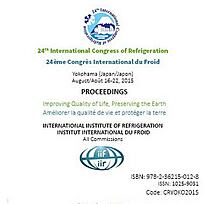
Document IIF
Une pompe à chaleur pour applications spatiales avec un système léger à compresseur centrifuge tri-étagé tournant à 200.000 tr/min.
A heat pump for space applications with a lightweight 200,000 RPM centrifugal three-stage compressor system.
Numéro : pap. n. 12
Auteurs : GERNER H. J. van, DONK G. van, PAUW A., et al.
Résumé
Satellites have to reject waste heat into space with radiators. These radiators largely determine the size of the satellite, and a further increase in radiator size to increase the heat rejection capacity is not practical. The heat rejection capacity can also be increased by using a heat pump to increase the radiator temperature of the satellite. However, traditional compressors are too heavy (40 kg) and cause too much vibrations. For this reason, a heat pump demonstrator with a lightweight (2 kg), low-vibration, centrifugal three-stage compressor system has been developed in a project funded by the European Space Agency (ESA). Tests were carried out with the heat pump, and the measured Coefficient of Performance (COP) is 2.3, which is higher than the ESA requirement of 2. The measured isentropic efficiency of the compressor is 68%, which is higher than existing aerospace compressors and even higher than some commercially available scroll compressors.
Documents disponibles
Format PDF
Pages : 8 p.
Disponible
Prix public
20 €
Prix membre*
Gratuit
* meilleur tarif applicable selon le type d'adhésion (voir le détail des avantages des adhésions individuelles et collectives)
Détails
- Titre original : A heat pump for space applications with a lightweight 200,000 RPM centrifugal three-stage compressor system.
- Identifiant de la fiche : 30015047
- Langues : Anglais
- Source : Proceedings of the 24th IIR International Congress of Refrigeration: Yokohama, Japan, August 16-22, 2015.
- Date d'édition : 16/08/2015
- DOI : http://dx.doi.org/10.18462/iir.icr.2015.0012
Liens
Voir d'autres communications du même compte rendu (657)
Voir le compte rendu de la conférence
Indexation
-
Thèmes :
Compresseurs;
Autres applications des pompes à chaleur - Mots-clés : Fonctionnement; Conception; Pompe à chaleur; Performance; Système polyétage; Espace; Compresseur
-
A new heat pump fluidized bed dryer with non-ad...
- Auteurs : JONASSEN O., STROMMEN I.
- Date : 20/08/1995
- Langues : Anglais
- Source : For a Better Quality of Life. 19th International Congress of Refrigeration.
- Formats : PDF
Voir la fiche
-
Super heat pump energy accumulation system: res...
- Auteurs : AKIYA T.
- Date : 03/08/1993
- Langues : Anglais
Voir la fiche
-
Chiller with heat recovery.
- Auteurs : BAILER P.
- Date : 24/01/1991
- Langues : Anglais
Voir la fiche
-
Design of oil-free turbocompressors for a two-s...
- Auteurs : JAVED A., ARPAGAUS C., BERTSCH S., et al.
- Date : 11/07/2016
- Langues : Anglais
- Source : 2016 Purdue Conferences. 23rd International Compressor Engineering Conference at Purdue.
- Formats : PDF
Voir la fiche
-
A MULTISTAGE ABSORPTION HEAT PUMP WITH STORAGE ...
- Auteurs : LE GOFF P., DIETRICH E., TRAP J. C.
- Date : 19/06/1985
- Langues : Anglais
- Source : Systems and components for large heat pumps.
- Formats : PDF
Voir la fiche
